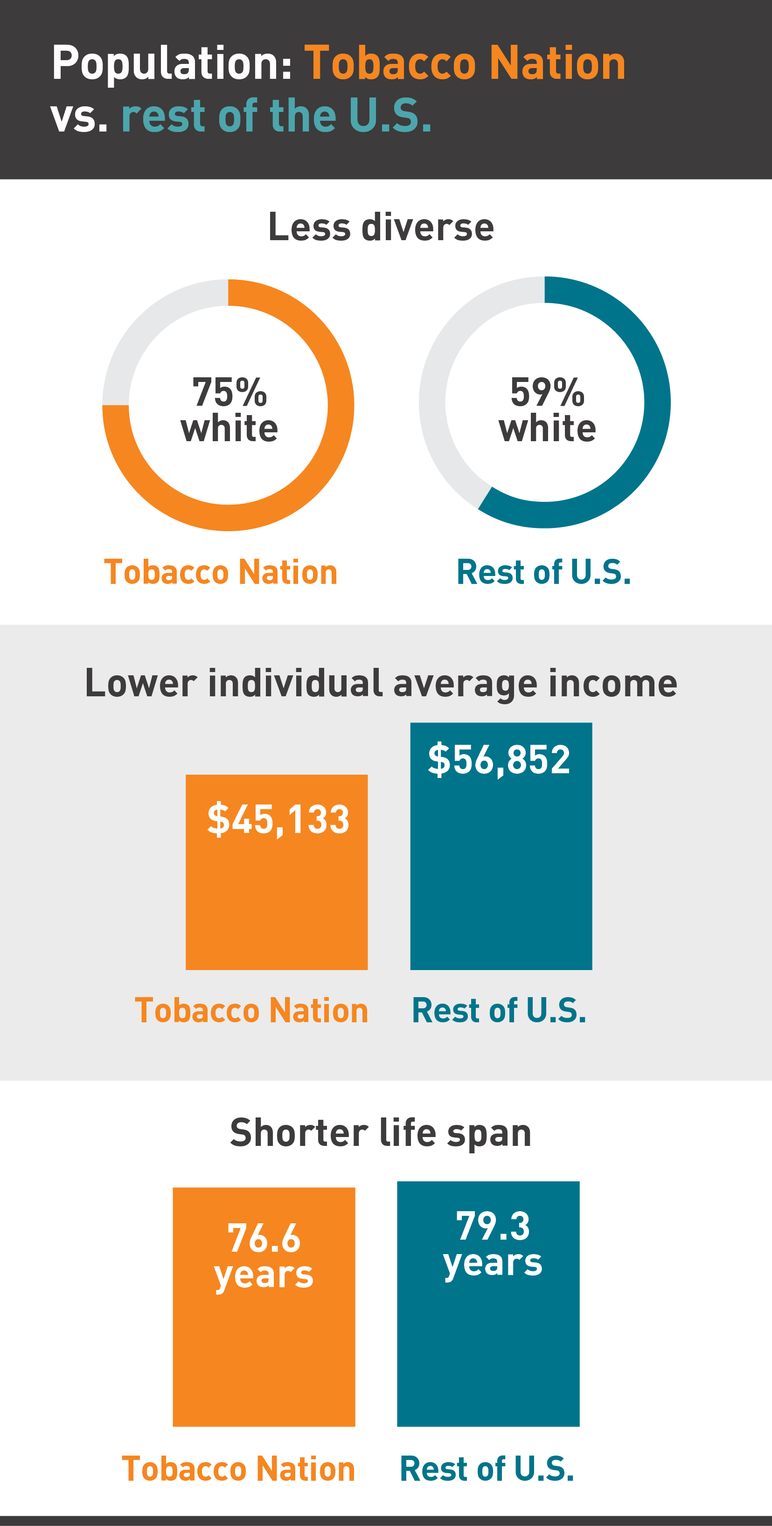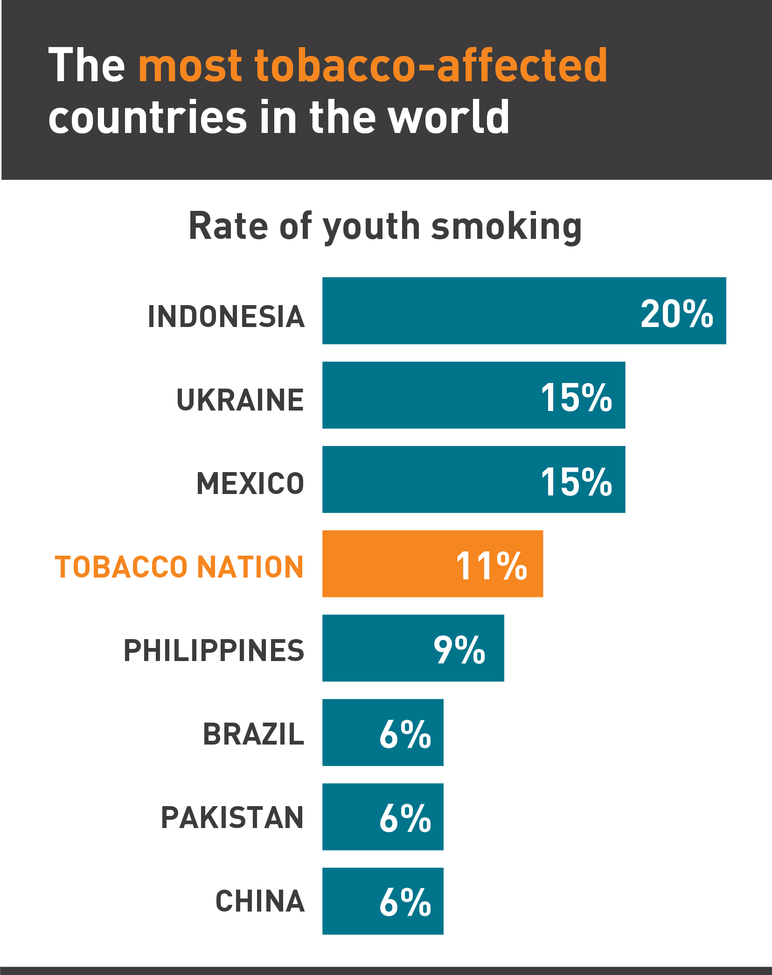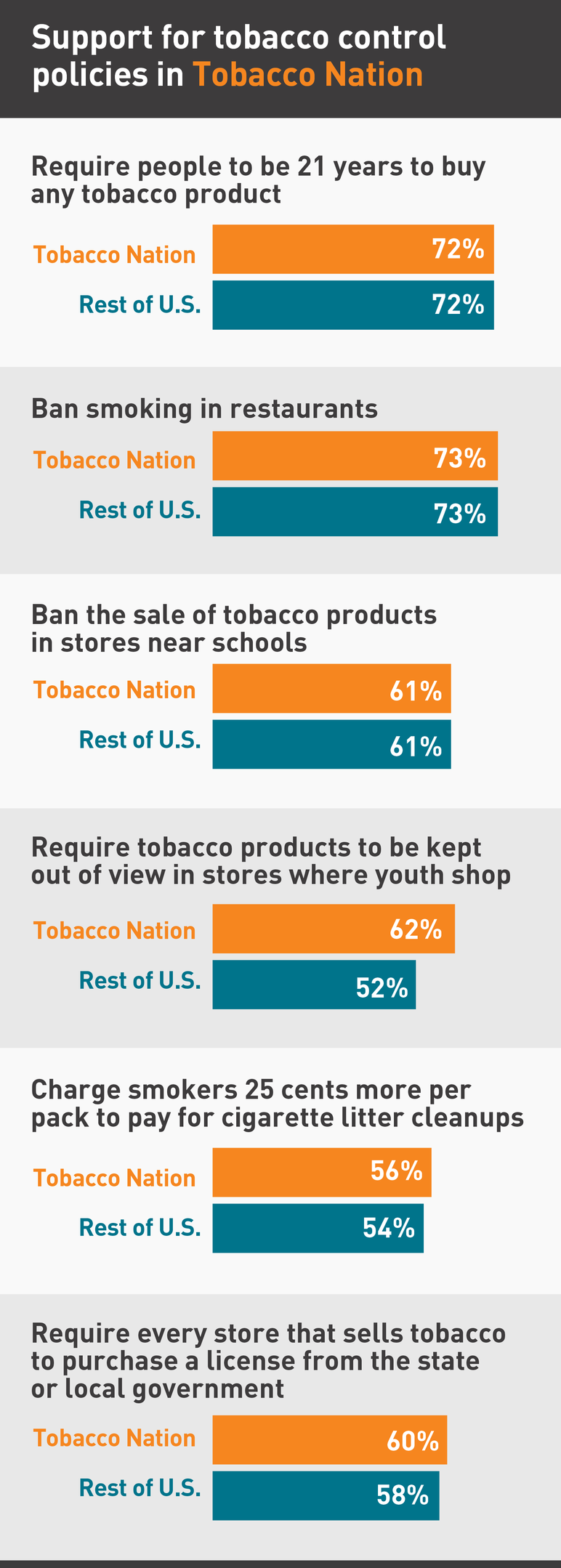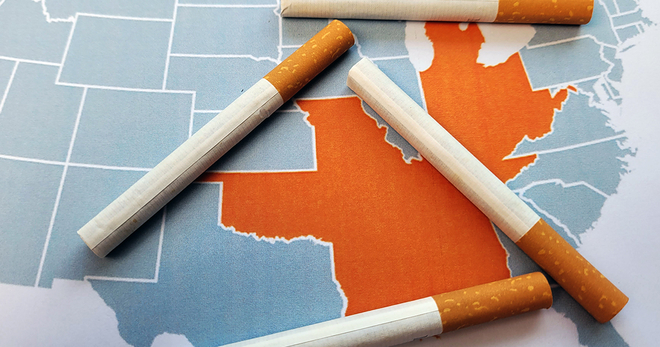Measuring support for tobacco control policies in states with deadly smoking disparities
In 2017, Truth Initiative® released a report highlighting a collection of states with smoking rates that rival the most cigarette-dependent countries on earth. These states, termed “Tobacco Nation,” have not only the nation’s highest adult smoking rates and poorer health outcomes compared with the U.S. as a whole, they also have largely failed to enact public health policies that could lessen their dependence on tobacco. In “Tobacco Nation: The Deadly State of Smoking Disparity in the United States,“ we argued that the lack of tobacco control policies exacerbated smoking rates and other health risks, and called for a set of policy actions that could help loosen the grip of tobacco on these communities.
This report revisits Tobacco Nation to gauge states’ support of these policies. How do individuals on the ground feel about laws to curb tobacco use? The answer, we learned, was somewhat surprising. Despite any reluctance leaders in Tobacco Nation states may feel about enacting sensible tobacco laws, residents of Tobacco Nation states support tobacco control policies at almost exactly the same level as their counterparts in states outside Tobacco Nation. In some cases, their support was higher. Inside or outside of Tobacco Nation, residents recognize that they deserve the same public health protections.
Tobacco Nation Background
Tobacco Nation is comprised of 12 states with the highest adult smoking prevalence: Alabama, Arkansas, Indiana, Kentucky, Louisiana, Michigan, Mississippi, Missouri, Ohio, Oklahoma, Tennessee and West Virginia. With more than 66 million residents, these states include roughly 20 percent of the U.S. population.

Tobacco Nation is both less diverse (whites comprise 75 percent of the population, compared with 59 percent in the rest of the U.S.) and less well-off financially. On average, individuals living in Tobacco Nation earn nearly 21 percent less per year ($45,133) than the average resident in the rest of the U.S. ($56,852).
Both youth and adult residents of Tobacco Nation smoke at higher rates (22 percent of adults and 11 percent of youth compared with 15 percent of adults and 6 percent of youth in the rest of the U.S.). They also smoke many more cigarettes per person every year (66.6 packs) than the rest of the U.S. (40.6 packs).
Those smoking rates place Tobacco Nation alongside the most tobacco-affected countries in the world. When compared to the Bloomberg Initiative’s 10 countries with the highest rates of tobacco use (China, Indonesia, Vietnam, Philippines, Brazil, Ukraine, Mexico, Bangladesh, Pakistan, India), Tobacco Nation has the fourth-highest rate of youth smoking (12 percent), behind only Indonesia (20 percent), Ukraine (15 percent) and Mexico (15 percent). The Philippines, Brazil, Pakistan, China, India, Vietnam and Bangladesh all had lower youth cigarette smoking rates. Adult smoking prevalence rates are not much better. Tobacco Nation has the fifth-highest rate (22 percent), behind only Indonesia (35 percent), Ukraine (29 percent), China (28 percent) and the Philippines (23 percent).

What all of this adds up to, for Tobacco Nation residents, is a shorter life span and a higher risk of dying. The average life expectancy in Tobacco Nation is 76.6 years, compared with 79.3 years in the rest of the U.S. Tobacco Nation residents are more likely to die from cancer and face much greater heart disease mortality than the rest of the U.S.
Facing poorer health and financial outcomes, Tobacco Nation states would benefit from comprehensive tobacco control policies. Yet the region is far less likely than other states to implement such policies. Lower taxes are levied on cigarettes, fewer Tobacco Nation states have raised the cigarette purchasing age to 21 and only two states in Tobacco Nation have laws forbidding smoking in workplaces, restaurants and bars.
By contrast, in the 38 states not included in Tobacco Nation, more than half of the states (23) have comprehensive smoke-free bans in place, which cover 65 percent of their population. Cigarette packs, on average, are 19 percent cheaper in Tobacco Nation ($5.48) than in the rest of the U.S. ($6.72), with a lower average excise tax (98 cents in Tobacco Nation compared to $1.89 in the rest of the U.S.). No state within Tobacco Nation has adopted state-wide Tobacco 21 laws that raise the legal purchasing age for tobacco.
Tobacco Nation Policy Support
Although the tobacco policy framework is currently lacking in much of Tobacco Nation, its residents favor policies that can make a difference in winning the war against tobacco. Truth Initiative conducted a survey to assess support for a number of tobacco control policy ideas, both in and outside of Tobacco Nation. We found that support did not differ between residents of Tobacco Nation and those in other states, and in fact, in some cases support for these policies was higher.
The survey used Lightspeed GMI’s online panel and was sponsored by RTI, an independent, not-for-profit research organization. Truth Initiative then analyzed the survey data using statistical methods to ensure that the survey was nationally representative and accurately represented the demographics and smoking characteristics of both Tobacco Nation and the remaining U.S. states (excluding Hawaii and Alaska). The survey was conducted from Dec. 14 and Dec. 19, 2017, with 1,601 participants.
Universal Support
Regardless of geography, the majority of survey participants favored several evidence-based policies.

- Tobacco 21: Seventy-two percent of both Tobacco Nation and the rest of the U.S. supported a requirement that people be 21 years old to buy any tobacco product.
- Smoke-free policies: Seventy-three percent of both Tobacco Nation and the rest of the U.S. supported a ban on smoking in restaurants, while 68 percent of both groups supported a ban on smoking in entrance ways of public buildings and workplaces. The majority of both groups also supported a ban on smoking in bars (Tobacco Nation: 53 percent, rest of U.S.: 57 percent) and using e-cigarettes in all indoor places (Tobacco Nation: 57 percent, rest of U.S.: 60 percent).
- Purchasing policies: Sixty-one percent of Tobacco Nation and 65 percent of the rest of the U.S. supported banning the sale of tobacco products in stores near schools. The majority of both groups also supported banning the sale of tobacco products in pharmacies (Tobacco Nation: 50 percent, rest of U.S.: 53 percent).
- Tobacco display in shops: Sixty-two percent of Tobacco Nation, compared with 52 percent of the rest of the U.S., supported requiring that tobacco products (such as packs of cigarettes) be kept out of view in stores where youth shop. Given Tobacco Nation’s higher youth tobacco use rate of 12 percent (compared to 9 percent in the rest of the U.S.), every barrier to youth purchases could make a difference.
- Litter fee: Fifty-six percent of Tobacco Nation residents supported the idea of charging smokers 25 cents more per pack to pay for cleaning up cigarette litter, compared with 54 percent of the rest of the U.S. In a region that smokes 26 more packs of cigarettes on average per year, the potential reduction in litter alone could be significant. San Francisco, for example, imposes a 75 cent fee on each pack of cigarettes as a cleaning fee.
- Licensing laws: Sixty percent of Tobacco Nation, compared with 58 percent of the rest of the U.S., supported requiring every store that sells tobacco to purchase a license from the state or local government. The ability to regulate the type and location of retail stores that sell tobacco is a valuable tool in restricting tobacco sales.
Support for Flavored Tobacco and Menthol Bans
Two-thirds to three-quarters of participants in both groups supported, or were neutral about, flavor and menthol bans, showing that the majority do not oppose the policy. Most are supportive — one half of both groups support menthol and flavor bans. Of those not declaring outright support, one-quarter to one-third were neutral to these policies, suggesting that they could be open to the idea of a flavor or menthol ban. San Francisco recently proved that public support can advance policy. In the city, 68 percent of residents voted to uphold a ban on both flavors and menthol tobacco products, despite the tobacco industry spending millions of dollars in opposition.
In San Francisco, 68% of residents voted to uphold a ban on both flavors and menthol tobacco products.
While the Food and Drug Administration announced in November 2018 that that they are going to propose a rule to restrict menthol cigarettes and flavored cigars, any action from the agency could take many years. In the meantime, state and local entities can, and should, continue to protect their citizens by enacting such sales restrictions.

Conclusions
No single public policy will end the scourge of tobacco use. But as the experience in the rest of the U.S. has shown, a comprehensive slate of tobacco control policies can make a significant difference in winning the war against tobacco. A region that smokes far more packs of cigarettes per year than the rest of the country would undoubtedly benefit from policies that increase the price of cigarettes and make it harder for young people to buy them. A large section of the country unprotected by the smoke-free laws enjoyed by most of the rest of the U.S. stands to gain cleaner air, improvements in health and a potential reduction in tobacco use.
In addition to the policy items suggested in the survey, the actions we called for in our previous report remain critically important. Higher taxes on cigarettes, comprehensive smoke-free laws, tobacco-related public education, increased public and private funding to combat tobacco use, quitting services and point-of-sale regulations that restrict youth access to tobacco products and marketing all play a key role in putting an end to the tobacco epidemic.
It is clear that Tobacco Nation does not have to and should not endure the status quo. Tobacco Nation residents want to be protected by practical tobacco control policies. While many leaders may have reluctance to enact these common sense measures, their constituents do not. Now is the time to educate elected representatives and other state and local leaders about these policies and the public support behind them. We must work to ensure that, regardless of where people live, they can be free from the negative health consequences of tobacco.
More in smoking by region
Want support quitting? Join EX Program
By clicking JOIN, you agree to the Terms, Text Message Terms and Privacy Policy.
Msg&Data rates may apply; msgs are automated.



